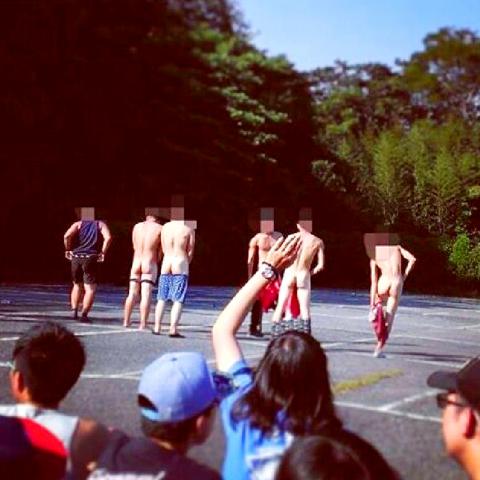Jinwen University of Science and Technology in New Taipei City has come under fire after an online report that alleged several student groups coerced first-year students to partially disrobe and take part in other racy activities during a freshmen welcome camping activity earlier this month.
A female netizen who identified herself as a Jinwen student on Monday night posted a report titled “Is nudity a must for welcoming parties” on Dcard, an online academic bulletin board.
She detailed what she called “disgusting” activities at a camping event organized by the students’ associations of four departments — applied foreign languages, marketing and logistics, electronic engineering and environment and property management — at a resort in Miaoli County. Department student groups are common at Taiwanese universities and function like fraternities and sororities.

Photo: screen grab from Facebook
“Some of the ‘punishments’ we were handed really disgusted me. I was forced to have physical contact with complete strangers on a bus,” the netizen wrote about the tasks the students were assigned after losing in games.
“We were asked to bite on candies pinned on others,” she wrote, adding that she was forced to take part even though she had said she did not want to.
“They made one of my friends lick someone else’s toes,” she said.
Participants were filmed by association members without their consent, she wrote.
Some students were forced to accept punishments even after they told association members that they did not wish to have physical contact with people other than their partners, she said.
“In a game played in the afternoon, male students were told to take off their underwear and female students their bras,” the netizen wrote.
“Many of the boys wandered stark naked in a meadow,” she said. “The girls that went bra-less were stared at. Those stares made me really uncomfortable.”
Students were also divided into groups that were named after genitalia, she said.
Her post drew more than 11,000 reactions and 1,800 comments as of press time last night.
Many of the comments condemned the organizers, while others said: “Do not let one bad apple spoil the whole bunch” and “Do not tar other Jinwen students with the same brush.”
Attorney Victor Chiang (姜智揚) said that the actions of the older students could constitute duress and sexual harassment.
Jinwen chief secretary Lin Shu-tuan (林淑端) said that the incidents were regrettable and that university officials had warned organizers of the trip not to “cross the line” when playing games.
Jinwen Office of Students’ Affairs director Yu Ti (于第) said that the event was “very inappropriate.”
The university would bring the case to its gender equality committee for investigation and those students found responsible for the escapades would face punishment, Yu said.

GAINING STEAM: The scheme initially failed to gather much attention, with only 188 cards issued in its first year, but gained popularity amid the COVID-19 pandemic Applications for the Employment Gold Card have increased in the past few years, with the card having been issued to a total of 13,191 people from 101 countries since its introduction in 2018, the National Development Council (NDC) said yesterday. Those who have received the card have included celebrities, such as former NBA star Dwight Howard and Australian-South Korean cheerleader Dahye Lee, the NDC said. The four-in-one Employment Gold Card combines a work permit, resident visa, Alien Resident Certificate (ARC) and re-entry permit. It was first introduced in February 2018 through the Act Governing Recruitment and Employment of Foreign Professionals (外國專業人才延攬及雇用法),

RESILIENCE: Deepening bilateral cooperation would extend the peace sustained over the 45 years since the Taiwan Relations Act, Greene said Taiwan-US relations are built on deep economic ties and shared values, American Institute in Taiwan (AIT) Director Raymond Greene said yesterday, adding that strengthening supply chain security in critical industries, enhancing societal resilience through cooperation and deepening partnerships are key to ensuring peace and stability for Taiwan in the years ahead. Greene made the remarks at the National Security Youth Forum, organized by National Taiwan University’s National Security and Strategy Studies Institution in Taipei. In his address in Mandarin Chinese, Greene said the Taiwan-US relationship is built on deep economic ties and shared interests, and grows stronger through the enduring friendship between

CAUTION URGED: Xiaohongshu and Douyin — the Chinese version of TikTok — are tools the Chinese government uses for its ‘united front’ propaganda, the MAC said Mainland Affairs Council (MAC) Minister Chiu Chui-cheng (邱垂正) yesterday urged people who use Chinese social media platforms to be cautious of being influenced by Beijing’s “united front” propaganda and undermining Taiwan’s sovereignty. Chiu made the remarks in response to queries about Chinese academic Zhang Weiwei (張維為) saying that as young Taiwanese are fond of interacting on Chinese app Xiaohongshu (小紅書, known as RedNote in English), “after unification with China, it would be easier to govern Taiwan than Hong Kong.” Zhang is professor of international relations at Shanghai’s Fudan University and director of its China Institute. When giving a speech at China’s Wuhan

ENHANCE DETERRENCE: Taiwan has to display ‘fierce resolve’ to defend itself for China to understand that the costs of war outweigh potential gains, Koo said Taiwan’s armed forces must reach a high level of combat readiness by 2027 to effectively deter a potential Chinese invasion, Minister of National Defense Wellington Koo (顧立雄) said in an interview with the Chinese-language Liberty Times (sister newspaper of the Taipei Times) published yesterday. His comments came three days after US Secretary of State Marco Rubio told the US Senate that deterring a Chinese attack on Taiwan requires making a conflict “cost more than what it’s worth.” Rubio made the remarks in response to a question about US policy on Taiwan’s defense from Republican Senator John Cornyn, who said that Chinese